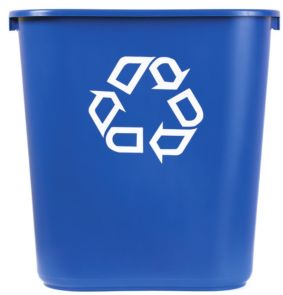Are recycling bins a good thing?
Many years ago, I attended a seminar on solid waste, aka garbage.
The confab was somewhere north of Chicago, the paper where I worked was in Tacoma, somewhere south of Seattle, where a garbage company wanted to build a new landfill, as the existing one was nearly full. The paper wanted to know: Should the county allow a new dump or should we do something else?
The old dump, not far from the proposed new one, was a pit that opened when LBJ was in the White House. For nearly 20 years, it took industrial waste and heavy metals in addition to regular trash. I once relished trips to that garbage heap, where you could take nearly as much stuff – crockery, clothes, Playboy magazines when dad wasn’t looking – as you left. It closed in 1998, a few years after the seminar north of Chicago. The U.S. Environmental Protection Agency has kept an eye and found no issues worth barking about.
There was talk of recycling at this longago solid-waste shindig near Chicago, but what I recall most was the presenter who said, hey, you folks from the West Coast, did you look down during your flight? We have plenty of room for dumps. I can’t remember staunch arguments to the contrary. Recycling, proponents said, raised awareness.
More than two decades later, awareness has been raised. But I still love landfills.
One of the things I like about Springfield is that recycling isn’t required, and refuse gets picked up once a week. Towns elsewhere have cut back to monthly collection, made recycling mandatory and employed garbage cops to snoop bins and write tickets. Here, I can throw away as much stuff as I like, and I do, from cans to cardboard to juice cartons to potato peelings. This has caused conflict. Over the years, I have had visitors sort through my garbage, uninvited, and separate what they deem reusable from what I think is trash, then haul the good stuff to a superior future. Almost invariably, they have driven SUVs and drunk bottled water.
And so I smugly welcomed news that stuff from U.S. recycling piles has long been shipped to China, which won’t take it anymore. It is, China says, garbage – find another place. Choked with trash once called a resource, places that once boasted high recycling rates have rekindled landfill love affairs.
Should we be worried? I called the city’s three trash haulers. Lake Area and Waste Management called back – I’m waiting to hear from Republic.
Waste Management makes it easy: Don’t worry, throw recyclables in one bin and we’ll take care of the rest. OK. Where does it go from there? Lisa Disbrow, Waste Management spokeswoman, says it gets hauled to Midwest Fiber in Bloomington, which charges a fee. Beyond that, she didn’t know. Midwest Fiber didn’t get back to me. Mark Mahoney, Springfield public works director, says that the city is keeping tabs, and stuff we discard in hopes it can be reused is, in fact, being recycled.
Sheri Crenshaw, Lake Area’s recycling guru, sounded convincing and realistic. Lake Area requires customers to separate aluminum from glass from other stuff, which makes recyclables easier to sell. So recycling is a moneymaker? Nope, says Crenshaw, who’s been at this since 1996. “It’s 23 years, and it’s not changed,” she says. “It’s not worth anything.”
Adena Rivas, program coordinator for the Springfield Public Works Department who oversees recycling programs, was the most thoughtful municipal employee I’ve spoken to in a long while about anything, and she convinced me to reconsider my stance, at least on aluminum cans. She defends recycling, as she should, it being her job. We’re doing well, she says, with the best available data showing that Springfield households recycle 464 pounds of throwaways per year, which is 107 pounds more than the national average. But Rivas acknowledges data gaps. Should we ship stuff to landfills on trains or are we better off sending trucks belching climate-warming emissions around neighborhoods to collect recyclables for which markets are weak? No one, it seems, knows for sure.
Rivas explained that there are seven types of plastics, with an eighth type en route, all of which must be separated to be recycled and one of which – Styrofoam – can’t be recycled via programs available in Springfield. She abhors putting plastic in dumps, but plastic, even for a landfill lover like me, is the devil. It’s choking oceans, and in all my trips to the dump, I never found anything made of plastic worth fetching.
The General Assembly for years has wrestled with bills aimed at disposable plastic bags, and bags mostly have won. The latest bill would levy a seven-cent fee on disposable plastic bags, payable at the register, which would seem to discourage use: If you don’t use bags, you’d pay nothing. That seems a good idea. Stuff that doesn’t get used doesn’t get made and so is neither recycled nor thrown away. Call it a win-win. Save the cancan for later.
Contact Bruce Rushton at [email protected].
Editor’s note
It’s
good that racial disparity in Springfield has become an issue in the
campaign for mayor. Rarely is the subject discussed so openly as it was
during Monday’s mayoral candidate forum sponsored by Faith Coalition for
the Common Good. But now that information is coming to the surface,
Springfield must correct injustices. That may not be so difficult. For
example, Mayor Jim Langfelder admitted that minority hiring within the
fire department – only 5 percent of 218 firefighters are minorities – is
not what it should be. That’s because “candidates often come from
surrounding rural areas and are white,” the mayor said. Well, mayor,
what are we doing to get candidates who are people of color? –Fletcher
Farrar, editor and CEO